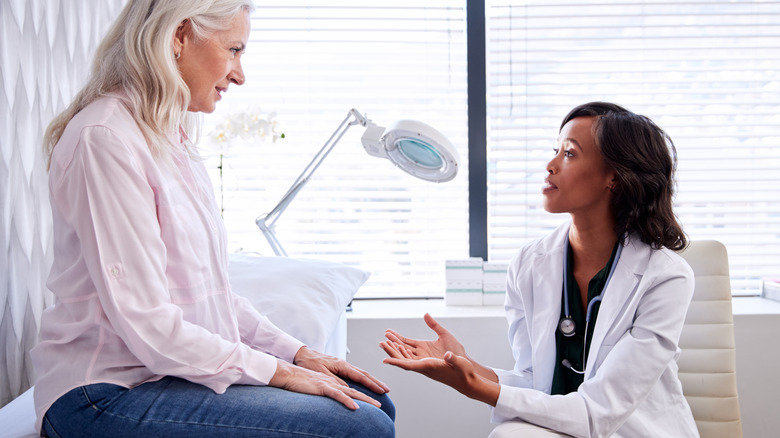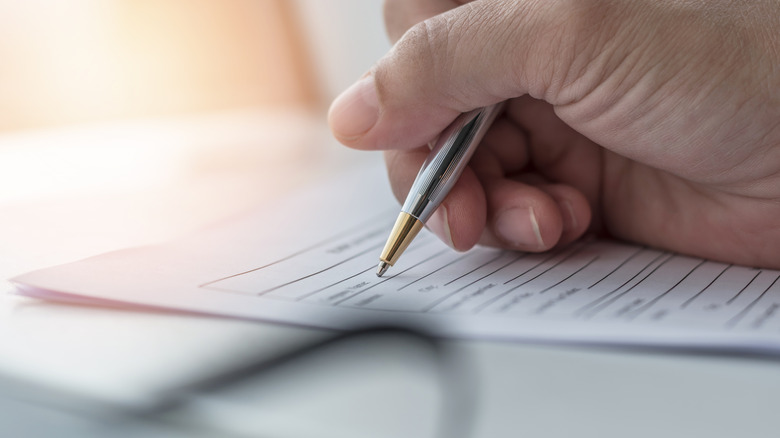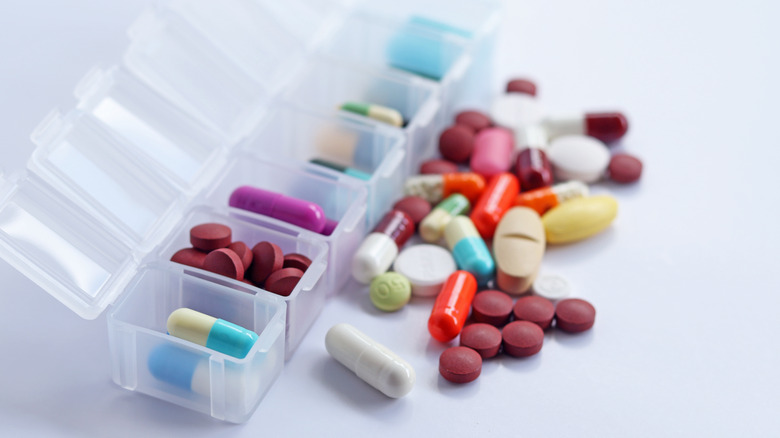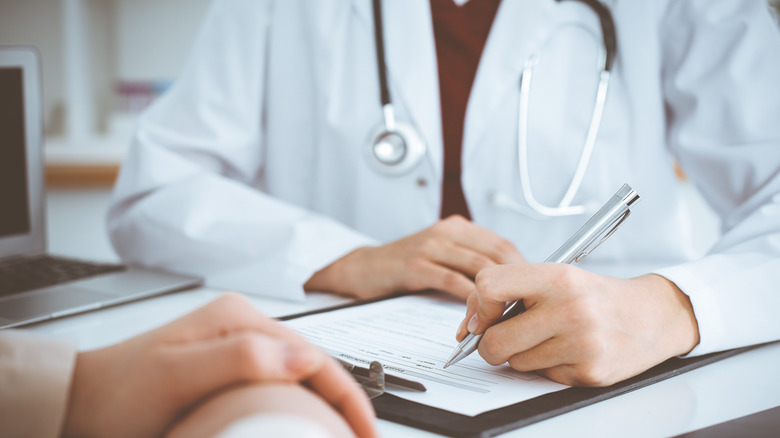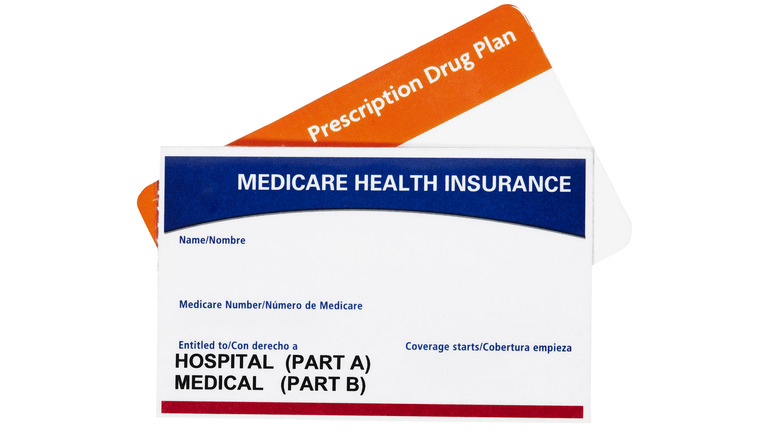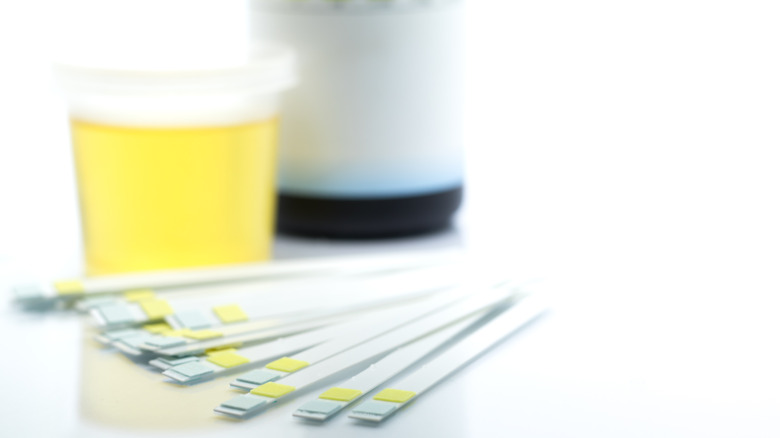Things You Should Always Do Before Going To The Doctor
Although many people tend to wait until a problem arises to schedule a doctor's appointment, it is important to be proactive and establish ways of prioritizing preventive care instead of scrambling for treatments or medicines that may or may not work. The frequency of checkups often depends on your individual risk factors, age, and any current medical conditions. According to Healthline, adults who are under 50 and in good health should see a doctor every three years for routine checkups. Adults over 50 should see a doctor once a year.
Given the importance of this visit, individuals should try their best to make it a collaborative and open process with their physician. Dr. Vivien Brown wants patients to work with their doctor and establish a team approach (via Best Health). She admitted that doctors traditionally don't have too much time to meet with patients (in some cases a maximum of 15 minutes each) so it is important for patients to do their due diligence and prepare. This way your doctor will be in a better place to address symptoms, potential issues, and the best course of action going forward. As you prepare for your next appointment, check out the following things you should always do before seeing your doc.
Make a list of questions and prioritize your concerns
Doctors are not mindreaders or soothsayers. They can't guess your concerns and if you don't come armed with a list of what is ailing you, you may leave the doctor's office feeling disappointed. To make the visit most effective, it is key to make a list and prioritize your concerns.
According to Penn Medicine, it is best to list all your questions prior to your visit when you're feeling less anxious and stressed. Chances are once the exam begins and the doctor starts his or her medical examination, you may feel tense and forget your questions. It's much easier to jot down your concerns on a piece of paper or take a few minutes before the doctor's appointment and make a note in your phone to convey to the physician. You can make this list as detailed or simple as you want, but you're less prone to miss your concerns if you think about them ahead of time.
Take note of all of your medications
For a doctor to be completely thorough with your examination, it is crucial to note all of your current medications. Are you taking prescription drugs, vitamins, supplements or any over-the-counter medications? Dr. Stephen Permut of Temple University School of Medicine says even if a patient is taking herbal remedies it is important information for the doctor to know (via WebMD).
If you're taking medications, "make sure you know the name of each drug, the dosage you're taking, and the number of times a day you take it," WebMD noted. Also, Permut recommends naming side effects that you might be feeling from any of the medications in case the doctor wants to try a different prescription. Even if you can describe the pills you're taking by naming the shapes and colors, doctors can't tell much from that information. Make a list of the medications you take while still at home and if necessary, take photographs of the bottle, as well as the pills, and keep them handy on your phone.
Bring a family member or friend for support
Sometimes patients get nervous before doctor's appointments and it might be necessary to bring a family member or a friend for support. Dr.Jasreem Bhullar of Beaumont Medicine says it is especially helpful if it is an elderly patient or individuals who have memory loss to help convey information to the physician (via Beaumont Medicine). In addition, if there is a language barrier and English isn't a patient's first language, a family member or friend may be able to translate.
In the case of a parent, it might be helpful for a son or daughter to help ask questions and what's next if there are more appointments or follow-ups. Sometimes transportation is needed, especially if the patient has trouble seeing or isn't great with directions. "Having a spouse in the room, especially if the patient is reluctant to be there, can help correct inaccurate information with recollections or not realizing they're doing something, such as dizzy spells or snoring," added Bhullar.
Fast before your doctor's appointment
You might be tempted to drink a few sips of your morning coffee and indulge in a breakfast sandwich before your doctor's appointment, but you may want to wait until after you're done with your examination. The slightest drink or meal can potentially skew your blood results. Dr. Nayana Ambardekar recommends the following fasting rules: "Fasting means you don't eat or drink anything but water usually for 8 to 12 hours beforehand. If your appointment is at 8 a.m. and you're told to fast for 8 hours, only water is OK after midnight. If it's a 12-hour fast, avoid food and drink after 8 p.m. the night before" (via WebMD).
Ambardekar says fasting is recommended to determine your glucose levels, cholesterol, iron, vitamin B12 levels, and more. It allows doctors to determine your baseline numbers and to assess what treatment is the best option. Certain food and drink choices may compromise those values and so it is best to fast to ensure the right strategy for your health.
Drink plenty of water
It is a good idea to drink plenty of water before your doctor's appointment. Dr. James Dewar, vice chairman of family medicine at the University of Pittsburgh Medical Center, advises individuals to stay hydrated before their examination (via The Healthy). According to Dewar, staying hydrated at the time of your physical will have an optimal impact on your pulse and blood pressure. Even mild dehydration can cause abnormalities in blood work and urine testing. Tests performed while an individual is dehydrated can skew the results. Dewar recommends that you still want to do what you'd normally do before a doctor's appointment, but in general, individuals should be drinking lots of water.
Some might be confused about how much water to drink. "The Institute of Medicine (IOM) recommends that men drink at least 101 ounces of water per day, which is a little under 13 cups. They say women should drink at least 74 ounces, which is a little over 9 cups," according to Healthline.
Refrain from using perfume
It's not wrong to want to present your best self when you come to the doctor. That might mean taking a shower, cleaning out your ears, washing your hair and various other grooming activities. However, individuals should consider refraining from using perfume or cologne before their doctor's appointment.
To perform an examination, it is expected that a doctor will have to enter into your personal space. According to Dr. Kevin Pho, if the doctor is sensitive to scents or has asthma, the perfume of cologne might prevent him or her from doing a thorough examination (via Kevin MD). Data indicates that one in 13 people in the United States has asthma so there is a decent chance that your physician might have sensitivities to perfume or cologne (via Asthma Allergy and Foundation of America). If wearing a scent is a part of your regular routine, you can do so after the examination is over.
Share your family health history
Knowing your family health history is an important tool to manage your health. Doctors often ask for this information because it helps them determine your risk factors for certain ailments and diseases. As such, it might be a good idea to call your parent(s) or speak to loved ones before going to the doctor (via Men's Health). "If three men in your family died of heart disease before age 50, that's crucial information your doctor should know," Dr. Ted Epperly, family medicine advisor for Men's Health, explained.
Family medicine specialist Matthew Goldman of the Cleveland Clinic agrees. "Be sure your family health history is up-to-date. Share any changes or new conditions of your family members with your provider," he explained to the Cleveland Clinic. This may include information regarding diabetes, heart disease, cholesterol, cancer diagnoses, and other potential illnesses.
Some information worksheets at the doctor's office require patients to also list ailments that impacted both paternal and maternal grandparents. Having a complete health history of your family is important so the doctor can note patterns and trends of illnesses that show a higher susceptibility to your family. Don't try to find out this information at the last minute because family members may forget or not have the specifics readily available.
Track your symptoms
The best way to maximize your health care visit is to be aware of what is happening to your body and making note of it. Trying to remember all of the symptoms you're been experiencing over the months or years while you're at the doctor's office may not be the best approach because you could easily forget or feel flustered.
If you have a chronic condition or a new set of symptoms you're concerned about, Dr. Kevin Pho recommends keeping track of your health in a journal (via Kevin MD). Ideally, the symptoms must be noted during a period of days or weeks and how they may or may not change closer to your doctor's appointment. Make note of any treatments you might be trying to help alleviate the symptoms. If you're keeping track of blood sugar or blood pressure values, make certain to note those as well. "Bringing the journal with you to your appointment can help remind you of your story, and allows for your doctor better understand what's going on and how your symptoms affect your daily life," said Dr. Pho.
Make sure your insurance information is current
The last thing you want to worry about before or during your doctor's appointment is whether your insurance information is current. Prior to the appointment, it is a good idea to call your insurance company, ask about coverage, and note any relevant numbers that the doctor's office might need to know. Dr. Danielle Ofri, an internist, said it also might help to scour your insurance company's website (via The New York Times). "Your insurance company's website may offer an online tool comparing the cost of having the same procedure or visit with different doctors. If you get your insurance through your employer, your Human Resources department may be able to help guide you to some of these tools," explained Ofri.
It might be a hassle to call your insurance company and be placed on hold, but it could save you long term headache "if you get a handle on technicalities of your health plan like co-pays, deductibles and co-insurance, and whether things like preventive care, mental health, physical therapy, drug rehab and out-of-network referrals are covered," revealed Ofri. For those who don't have insurance, call the office prior to your visit. Some offices offer payment plans or can reduce the fee if you pay cash.
Be prepared to be honest
Although you may be feeling nervous, anxious, or embarrassed in front of your doctor, don't be afraid to share your symptoms. Your doctor relies on the information you give and if you're leaving things out, it leaves the physician to do the guesswork on medications and potential treatments. This means you'll also want to be upfront about your sexual health if exposed to sexually transmitted infections or disease, Dr. Matthew Goldman of the Cleveland Clinic told Self. Of course, these topics are uncomfortable to discuss, but the sooner the doctor knows the cause he can investigate treatment options.
If you decide to do your own research via Dr. Google, share what you have learned but make certain the information you've found comes from reliable sources. In cases where you leave the office and forgot to mention a particular issue, call or email the nurse or nurse practitioner so the doctor is aware of the issue. The doctor's office will likely note your concern in your chart and follow up with you (via Self).
Skip the morning sex
Even though it might not be something you think about skewing your results from the doctor's office, having sex "before a urinalysis can cause semen to appear in your sample, which may obscure the results," according to Men's Health. According to Dr. Ted Epperly, family medicine advisor for Men's Health, men who are going to see the doctor for matters concerning their prostate, bladder, or testicles could have their results impacted by earlier sexual activity. The doctor recommends not having sex for about 24 hours before your appointment.
For women, having sex can impact pap smear results (via Glamour). Dr. Jessica Shepherd, an assistant professor of clinical obstetrics and gynecology and director of Minimally Invasive Gynecology at the University of Illinois College of Medicine at Chicago explained that the presence of semen can make cervical cells harder to see and could cause misreads in pap results.
Avoid changing your diet
Try not to make any sweeping changes before your appointment with your physician. It is best to represent your normal lifestyle. And changes you make just before your appointment won't necessarily reflect in your bloodwork because it takes some time for cholesterol and blood sugar to change (via The Healthy). "Your providers would like you to be honest and upfront about your lifestyle and diet so they can have an accurate history of your health and provide you with the best possible care," Dr. Gregory John Galbreath, a PIH Health physician in Whittier, California, told the publication.
Of course, if your doctor recommends a healthier diet or increased exercise, you'll want to heed that advice. As your doctor will no doubt tell you, the best approach is to institute changes that are healthy and sustainable over a long period of time instead of a short fix.
It is important to relax
Although it might be natural to have some jitters before you walk into your doctor's appointment, try to relax. Remember you're taking proactive measures to take care of your health and preventive care is a key component. And the physicians are there to help you attain your best health (via Cleveland Clinic). According to family medicine specialist Matthew Goldman, even a little nervousness can cause "white-coat hypertension, which means their blood pressure actually rises higher than normal when they are in the provider's office."
A good practice is to take a few deep breaths or say positive messages to yourself while you're waiting for your appointment. If you need a healthy distraction, bring a book or crossword puzzle to keep your mind occupied. Try to plan ahead for your doctor's appointment so that you aren't rushing right before they call you in — even being a few minutes late can potentially cause your pulse and blood pressure to rise. Have something positive planned after your doctor's appointment so you have something to look forward to after your examination. Also, let a couple of friends or family members know that you're going to the doctor so they know to check up on you after the appointment.

